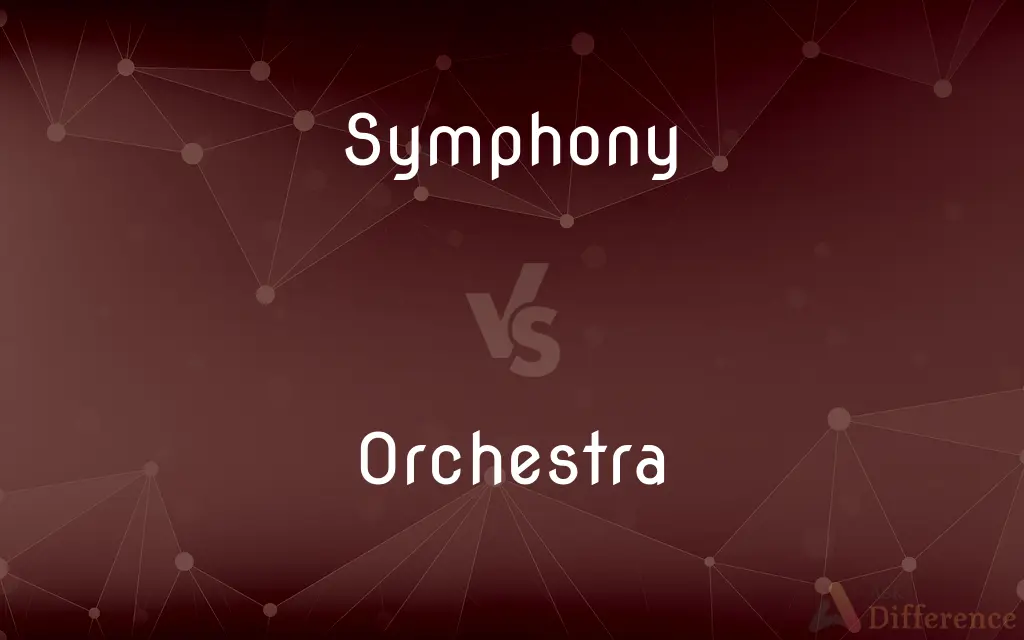Symphony vs. Orchestra — What's the Difference?
Edited by Tayyaba Rehman — By Maham Liaqat — Updated on March 24, 2024
A symphony is a large-scale musical composition, typically classical, involving an orchestra; an orchestra is a large group of musicians playing various instruments together.

Difference Between Symphony and Orchestra
Table of Contents
ADVERTISEMENT
Key Differences
A symphony is a complex musical work often composed of multiple movements that explore various themes and musical ideas, requiring the coordinated effort of different sections of an orchestra. On the other hand, an orchestra refers to the ensemble of musicians itself, which can vary in size but typically includes strings, woodwinds, brass, and percussion sections.
While a symphony employs the structure and range of an orchestra to achieve its expressive goals, exploring dynamics, harmony, and melody, the orchestra serves as the medium through which symphonies and other compositions are brought to life. An orchestra's composition and size can be tailored to the specific requirements of the symphony it performs, with some works necessitating larger ensembles.
The role of the conductor is pivotal in both contexts but serves different purposes: in a symphony, the conductor interprets the composition, shaping its tempo, dynamics, and expression, whereas, in an orchestra, the conductor leads the musicians, ensuring cohesion and synchrony among the various sections.
Symphonies represent the artistic vision of a composer, encapsulated within a musical format that demands technical skill and emotional depth from its performers. Conversely, orchestras are dynamic entities that adapt to a wide range of musical styles and periods, from baroque to contemporary, showcasing the versatility and craftsmanship of their members.
Despite their differences, symphonies and orchestras are intimately connected, with the performance of a symphony being one of the highest forms of orchestral expression. This relationship highlights the synergy between composition and performance in the realm of classical music.
ADVERTISEMENT
Comparison Chart
Definition
A large-scale musical composition for orchestra, often in multiple movements
A large ensemble of musicians playing various instruments together
Composition
Multiple movements with thematic development
Strings, woodwinds, brass, and percussion sections
Role
To be performed by an orchestra, showcasing musical themes and ideas
To perform symphonies and other musical works, providing the instrumental foundation
Focus
Artistic and emotional expression through structured movements
Musical performance and interpretation of composers' works
Conductor's Role
To interpret the symphony's tempo, dynamics, and expression
To lead and ensure cohesion among the orchestra's sections
Compare with Definitions
Symphony
Requires a wide range of orchestral colors and dynamics.
The symphony’s third movement showcased the woodwind section.
Orchestra
Led by a conductor who guides the performance.
The conductor led the orchestra with precise gestures.
Symphony
Explores thematic development and variation within a structured form.
The symphony moved through a dramatic range of emotions.
Orchestra
Varies in size according to the works being performed.
The orchestra expanded its brass section for this performance.
Symphony
Performed by orchestras in concert halls worldwide.
The local orchestra received standing ovations for their symphony performance.
Orchestra
A versatile ensemble capable of conveying complex musical expressions.
The orchestra's rendition captured the nuanced dynamics of the score.
Symphony
Reflects the composer's artistic vision and emotional depth.
The symphony was a profound reflection on the nature of freedom.
Orchestra
A group of musicians playing instruments together, typically including strings, brass, woodwind, and percussion.
The orchestra tuned their instruments before the concert.
Symphony
A musical composition for orchestra, characterized by complexity and multiple movements.
Beethoven's Ninth Symphony is renowned for its choral finale.
Orchestra
Performs a wide repertoire, from symphonies to modern compositions.
Tonight, the orchestra will perform works ranging from Bach to Bernstein.
Symphony
A symphony is an extended musical composition in Western classical music, written by composers, most often for orchestra. Although the term has had many meanings from its origins in the ancient Greek era, by the late 18th century the word had taken on the meaning common today: a work usually consisting of multiple distinct sections or movements, often four, with the first movement in sonata form.
Orchestra
An orchestra (; Italian: [orˈkɛstra]) is a large instrumental ensemble typical of classical music, which combines instruments from different families, including bowed string instruments such as the violin, viola, cello, and double bass woodwinds such as the flute, oboe, clarinet, and bassoon brass instruments such as the horn, trumpet, trombone, and tuba percussion instruments such as the timpani, snare drum, bass drum, cymbals, triangle, tambourine, and mallet percussion instrumentseach grouped in sections. Other instruments such as the piano, harpsichord, and celesta may sometimes appear in a fifth keyboard section or may stand alone as soloist instruments, as may the concert harp and, for performances of some modern compositions, electronic instruments and guitars.A full-size Western orchestra may sometimes be called a symphony orchestra or philharmonic orchestra (from Greek phil-, "loving", and "harmony").
Symphony
An extended piece in three or more movements for symphony orchestra.
Orchestra
A large group of musicians who play together on various instruments, usually including strings, woodwinds, brass instruments, and percussion instruments.
Symphony
An instrumental passage in a vocal or choral composition.
Orchestra
The instruments played by such a group.
Symphony
An instrumental overture or interlude, as in early opera.
Orchestra
The area in a theater or concert hall where the musicians sit, immediately in front of and below the stage.
Symphony
A symphony orchestra.
Orchestra
The front section of seats nearest the stage in a theater.
Symphony
An orchestral concert.
Orchestra
The entire main floor of a theater.
Symphony
Harmony, especially of sound or color.
Orchestra
A semicircular space in front of the stage used by the chorus in ancient Greek theaters.
Symphony
Something characterized by a harmonious combination of elements.
Orchestra
(music) A large group of musicians who play together on various instruments, usually including some from strings, woodwind, brass and/or percussion; the instruments played by such a group.
Symphony
An extended piece of music of sophisticated structure, usually for orchestra.
Orchestra
A semicircular space in front of the stage used by the chorus in Ancient Greek and Hellenistic theatres.
Symphony
(music) An instrumental introduction or termination to a vocal composition.
Orchestra
The area in a theatre or concert hall where the musicians sit, immediately in front of and below the stage, sometimes (also) used by other performers.
Symphony
Harmony in music or colour, or a harmonious combination of elements.
Orchestra
The space in a theater between the stage and the audience; - originally appropriated by the Greeks to the chorus and its evolutions, afterward by the Romans to persons of distinction, and by the moderns to a band of instrumental musicians. Now commonly called orchestra pit, to distinguish it from the section of the main floor occupied by spectators.
Symphony
A symphony orchestra.
Orchestra
The space in the main floor of a theater in which the audience sits; also, the forward spectator section of the main floor, in distinction from the parterre, which is the rear section of the main floor.
Symphony
A consonance or harmony of sounds, agreeable to the ear, whether the sounds are vocal or instrumental, or both.
The trumpets sound,And warlike symphony in heard around.
Orchestra
The place in any public hall appropriated to a band of instrumental musicians.
Symphony
A stringed instrument formerly in use, somewhat resembling the virginal.
With harp and pipe and symphony.
Orchestra
Loosely: A band of instrumental musicians performing in a theater, concert hall, or other place of public amusement.
Symphony
An elaborate instrumental composition for a full orchestra, consisting usually, like the sonata, of three or four contrasted yet inwardly related movements, as the allegro, the adagio, the minuet and trio, or scherzo, and the finale in quick time. The term has recently been applied to large orchestral works in freer form, with arguments or programmes to explain their meaning, such as the "symphonic poems" of Liszt. The term was formerly applied to any composition for an orchestra, as overtures, etc., and still earlier, to certain compositions partly vocal, partly instrumental.
Orchestra
The instruments employed by a full band, collectively; as, an orchestra of forty stringed instruments, with proper complement of wind instruments.
Symphony
A long and complex sonata for symphony orchestra
Orchestra
A musical organization consisting of a group of instrumentalists including string players
Symphony
A large orchestra; can perform symphonies;
We heard the Vienna symphony
Orchestra
Seating on the main floor in a theater
Common Curiosities
What is a symphony?
A symphony is a large-scale musical composition for an orchestra, typically structured in multiple movements, that explores thematic and emotional depth.
What is an orchestra?
An orchestra is a large ensemble of musicians playing together, usually comprising string, woodwind, brass, and percussion instruments.
Can any orchestra perform a symphony?
Yes, but the specific requirements of the symphony may dictate the size and composition of the orchestra needed to perform it effectively.
Can orchestras play music other than symphonies?
Yes, orchestras perform a wide range of music, including concertos, overtures, suites, and contemporary pieces.
Do all symphonies require a full orchestra?
No, the size and composition of the orchestra can vary depending on the symphony's requirements; some symphonies may call for a smaller or specialized ensemble.
How does a symphony differ from an orchestra?
A symphony refers to a specific type of musical composition performed by an orchestra, while the orchestra is the group of musicians that performs symphonies among other works.
Is a symphony always classical music?
While symphonies are most commonly associated with classical music, the term can apply to works in other genres that share similar structural characteristics.
What is the difference between a symphony orchestra and a chamber orchestra?
A symphony orchestra is larger and performs a broad repertoire, including symphonies that require a full range of instruments, while a chamber orchestra is smaller and typically performs works suited to a more intimate ensemble.
Why is a conductor important for both a symphony and an orchestra?
A conductor ensures that the orchestra performs cohesively and interprets the symphony according to the composer’s intentions, balancing the ensemble’s sound and dynamics.
How is a symphony structured?
A symphony is usually structured in multiple movements, each with its own tempo and mood, often following a fast-slow-fast pattern.
How many movements does a symphony have?
A symphony typically has three to four movements, each with its distinct tempo and character.
How long does a typical symphony last?
The duration of a symphony can vary widely, from about 20 minutes to over an hour, depending on the work and its movements.
What role do string instruments play in an orchestra?
String instruments form the core of the orchestra, providing a wide range of tones and dynamics that underpin most orchestral works.
Are there modern symphonies?
Yes, composers continue to write symphonies that explore contemporary themes and musical languages.
Can a symphony include vocal parts?
Yes, some symphonies, like Beethoven’s Ninth Symphony, incorporate vocal soloists and choirs, blending orchestral and vocal music.
Share Your Discovery

Previous Comparison
Track vs. Trail
Next Comparison
Old vs. OlderAuthor Spotlight
Written by
Maham LiaqatEdited by
Tayyaba RehmanTayyaba Rehman is a distinguished writer, currently serving as a primary contributor to askdifference.com. As a researcher in semantics and etymology, Tayyaba's passion for the complexity of languages and their distinctions has found a perfect home on the platform. Tayyaba delves into the intricacies of language, distinguishing between commonly confused words and phrases, thereby providing clarity for readers worldwide.














































